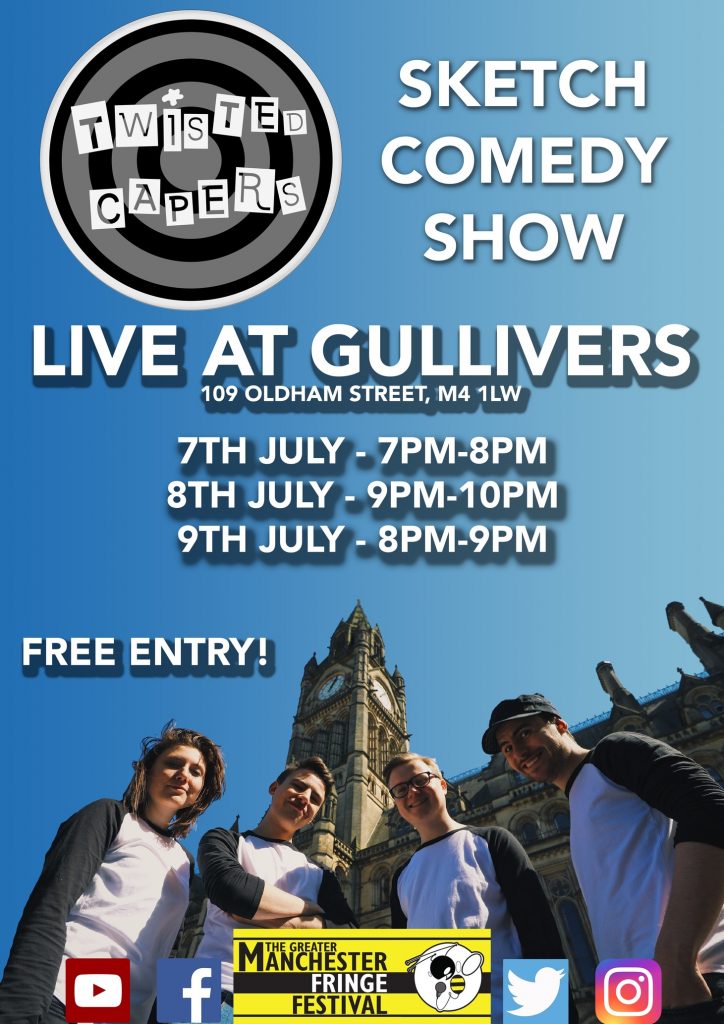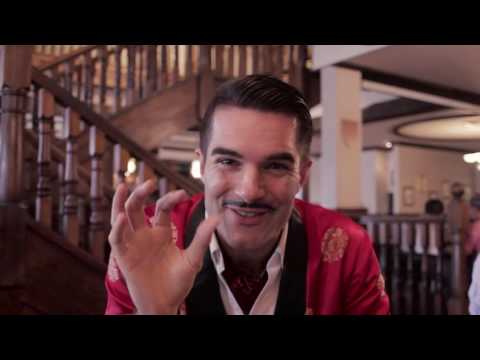Do you want to turn your passion for comedy into a career? Lee Dilley and Paul Farrell started writing together after meeting at university and have worked on a range of comedy projects alongside their day jobs. Now they have co-founded their own production company, Goat Tree Films, and have been privately commissioned to write, produce and direct sitcom pilot ‘In The Dog House’, which premieres on Tuesday 23rd August.
Their journey is one that many Comedy Crowders will relate and aspire to, so we caught up with them to ask about their experience so far. Their responses contain some great insights about how they write together, what they’ve learned about creating real characters, and why they’re always working on multiple projects.
How did you get into comedy writing?
LD: ‘Very slowly but naturally, like putting on an old pair of slippers. I say naturally, but not easily; first you have to wear the slippers in. From watching comedy such as the Two Ronnies, Morecambe and Wise, Porridge, Black Adder, The Office, Inbetweeners, Fawlty Towers and of course Only Fools And Horses all my life, the next natural step was to imitate them in some shape or form. I was never any good at writing because of my dyslexia, so telling comedy stories verbally was my high. I tried writing but my confidence and inexperience hindered me, I even posted some early work off but I never even got a reply unless it was a bounce back. It’s the equivalent of messaging everyone on a dating app and the only reply is the dating app recommending a different app. At the start the writing isn’t the hard part at all – anyone can write. The hard part is being prepared to be judged on your writing, that’s the real art. Once you shake that bit off you will have the confidence to paint your personality into every word and then the words will start to feel real and breathe. I say this now but I couldn’t call myself a writer until I met my writing partner, Paul during my time at University. He also had a quietened voice, but really wanted to scream about comedy, a love for stories, great dialogue and character arcs. More than that, Paul had something I missed completely, “structure”; if story is King it’s nothing without its Queen of structure. Nail the structure and worst case scenario you’ll still end up with a standing house, 2 out of 3 pigs get this wrong.’
PF: ‘By being that pig for a long time. I’ve always aimlessly written since I was a child without ever realising that it could become a career (that’s still debatable), so once that clicked I went to University and met Lee. Basically, I paid 20 grand to meet my writing partner. I grew up wearing out VHS copies of Only Fools and Horses so comedy is engrained in my writing.’
Tell us about the first comedy script you wrote?
LD: ‘It was Jobseekers #jobseekerssitcom inspired by the credit crunch and high unemployment rates, we [myself & Paul] didn’t just write it, we made it. I sold my only car, my precious classic Mini to fund the project and what money we had from our dwindling student loans (don’t worry, we’re never paying it back at this rate) we then premiered the pilot at Derby Quad Cinema and BAFTA and we were then signed to a UK Top 100 production company. Since then Jobseekers made it to commissioners’ tables from BBC CH4, ITV and more. Jobseekers unfortunately never got picked up but we had some very interesting feedback and about 50 re-writes during the 2 year pitching process.’
PF: ‘With Jobseekers it really was a crash course for us as new writers, you don’t exactly expect your first script to hit the desks of the major channels but it did (and it’s still sitting on a few). What we learnt was to not get to caught up in one project; you should have a catalogue of scripts and pitches on the go at any one time.’
How did your comedy journey progress?
LD: ‘Stories are about unravelling. Think of a knot in a ball of string, well the character has to find a way to that knot, sometimes making others but eventually they learn the way and all is undone again. The writing process is the same, you have to find your knots, what bugs you, what gets you out of bed in the morning or what stops you going to sleep at night. Find that knot then create a character and set them out to find it, the truth, the answer or question. As you might notice I enjoy a metaphor but I suppose put simply, the journey is one of truth, you have to be truly honest about yourself and why you do things as a character, you might not like what you see but eventually you realise they are natural reactions even if they are selfish, inconsiderate, rude, hurtful etc.. Nobody is perfect which means no character is either and that ‘false knot’ will stand out like a leather jacket at a vegan fair. Be honest it’s human, we have all these emotions for a reason, it’s normal, what isn’t normal is trying to hide it.’
PF: ‘It’s constant evolution. New found knowledge will destroy everything you have ever written but for the better. So the learning journey of the craft is a bumpy one, but the most rewarding. Even though we are only just on the road ourselves, we have written scripts in a variety of formats now from features to stand up. Each having their distinct hidden rules and boundaries to find that you can’t see without launching yourself feet first with eyes open. We are currently working on our latest feature film script called ‘UFHoax’ with all fingers and toes crossed this one will break free of the page.’
You’ve worked in roles as varied as a croupier and a nursery play worker – how important is life experience to being a good writer?
LD: ‘Very important if you want to write about a nocturnal croupier who works as a play worker in the day. Seriously though, I’d say extremely important – I’ve probably had 50 different jobs in my day but it isn’t particularly the job it’s who is doing them and why? People, it’s all about the people. Everyone has a story and experience is listening to and living through other people’s stories.’
PF: ‘Dead end jobs? Truthfully, it adds a grit and determination and a good fear of taking a backwards step if you don’t take an opportunity that appears.’
What would you advise someone who wants to write but doesn’t have a diverse range of life experience?
LD: ‘I’d say go get some! That’s exactly what I told myself at 21, and I went and worked on cruise ships and travelled to 5 continents and 45+ countries to find stories and create my own. Before travelling I created false knots in my stories, stories with part truths, too exaggerated, paper thin characters.’
PF: ‘You’ll write nothing feeling numb, so go out there and feel, good and bad. Also be fully aware that writing is a bizarrely twisted profession. You sit in a dark room in complete and utter self-isolation dreaming up human interactions. So it’s probably best to go out there and learn and experience what you’re going to spend your life banging on about.’
Tell us about your writing process?
LD: ‘So random we could never get assassinated, as a writing duo we meet whenever we can, after work, weekends, on the phone, in the pub before 2 pints. Unfortunately routine can only happen with paid work, and as writers you work for love and then you get money when other people fall in love with your work, which isn’t an easy achievement. I think as a duo it’s best to get the structure, chat about possible problems, outline the characters then go off individually to write jokes and dialogue, then pitch it the other writer as the character. Writing by myself I find 2am is the best time for me, I need absolute quiet, no TV, no phone and no next doors lawnmower. I do write in the morning sometimes but I hit walls quicker, walls not blokes, although it can mean the same thing. Your character might have taken a wrong turn and hit a wall, a bloke means you wrote the wrong character and he can’t get over the wall ‘end of story’. A wall means you need to have a break, usually a shower and find the way your character would try and get over the wall (obstetrical).’
PF: ‘Late Dinner. Gossiping like old women on a bus. Snack break. One great idea. That will do for today.’
How important is it to have a writing partner?
LD: ‘For British comedy it’s usually a duo, although John Sullivan wrote Only Fools And Horses on his own but he’s a comedy genius and an exception to the rule. I imagine it’s very difficult to find a writing partner with the exact same sense of humour, resilience, enthusiasm, goals and most importantly honesty. As a writing duo we lie down like therapy and confess our failures, needs, wants and could never gets.’
PF: ‘Its main benefit is having an audience member with you at all points so your ideas are always being challenged and questioned. ‘Why’ is our favourite word as you have to challenge every single word in a script. We usually find if one of us really fights for an idea it usually means they’re right.’
Tell us about Goat Tree Films
LD: ‘The name is all about how we as a couple of working class blokes look odd as writers, and so does a goat in a tree. However it seems to work somehow, and bonus, it’s funny to look at. Our mantra is we believe a great story promotes change. We also promote women in media, which brings us onto the next question nicely, that’s another thing about writing… plan ahead.’
PF: ‘We’ve always felt slightly like the out crowd, a couple of unfashionable filmmakers who don’t go home and watch a 1921 film from Botswana. We watch Jurassic Park. So Goat Tree felt perfectly awkward for us. Plus we also don’t have very catchy names.’
Tell us about your current project, ‘In the Dog House’?
PF: ‘ In The Dog House is a sitcom pilot inspired by the books of Sid Jenkins, who has devoted over 50 years of his life to animal welfare. It follows a group of naive kennel workers who go rogue to solve animal related crimes.
Finally, what advice would your current self give to your past-self at the point you started on your writing journey?
LD: ‘I would probably say nothing, because the truth would be, you’re not going to make it this year or the next, or the next and it’s going to cost you a lot of money and time. Sometimes it’s better not to warn yourself of the end goal because you won’t enjoy the ride. Or I’d say, structure, get the structure write you stupid prick do you realise how much we’ve had to write around your problems, move scenes, delete scenes, erase characters, days and weeks wasted.’
PF: ‘Those that talk the talk, rarely walk the walk.’
Tickets to the premiere of Lee and Paul’s latest comedy In The Dog House can be bought here .
Want to turn your comedy passion into something more? Here at The Comedy Crowd we are building a community that works together to create great comedy. Subscribe to our weekly newsletter for the latest opportunities, advice and tools to create comedy:


 We are all fans of Connor Ratliff a comedian at UCB. He is king of the slow build comedy bits – he’s run for president (and made a 50 page book to go with that campaign) and trained for the Olympics – team Rio! How could we commit to a wedding show (without getting married)? We could all become ordained ministers! This was an idea from the first ideas generation session, and a few clicks later we’re all ordained and can actually marry people. Do all those extra bits! We made an order of service with wedding advice tips, we gave everyone cake, we’ve even made a film of the wedding.
We are all fans of Connor Ratliff a comedian at UCB. He is king of the slow build comedy bits – he’s run for president (and made a 50 page book to go with that campaign) and trained for the Olympics – team Rio! How could we commit to a wedding show (without getting married)? We could all become ordained ministers! This was an idea from the first ideas generation session, and a few clicks later we’re all ordained and can actually marry people. Do all those extra bits! We made an order of service with wedding advice tips, we gave everyone cake, we’ve even made a film of the wedding.

